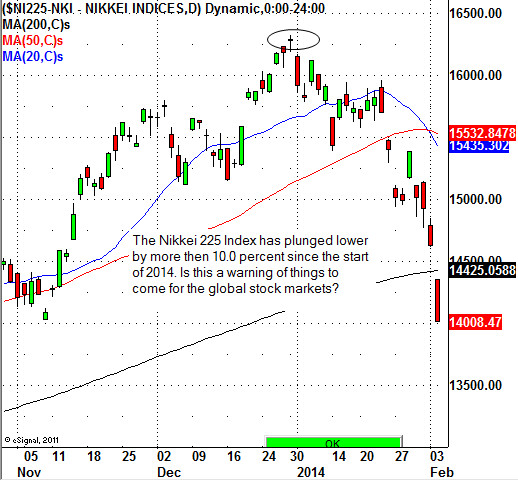As we all know, stock markets around the world have tumbled in 2014 so far. The Nikkei 225 Index is trading down by over 10.0 percent since the start of the New Year. Other leading stock indexes such as the Dow Jones Industrial Average and the S&P 500 Index are trading lower by more than 5.0 percent. While these declines are not really that much in the scheme of the recent bull market, they are occurring at a time of the year when market should be strong. Most traders know that the best months for stocks are from November to April. When the markets close lower in the month of January, it is a warning sign that 2014 could be a very weak year for the major stock indexes.
Below, I will give you three reasons why any short term bounce is just a tourniquet for this market.
1. The large institutions are still highly leveraged to the weak Japanese yen trade. Since late 2012, the large institutional firms have been betting that the Japanese yen would continue to decline. After all, the Japanese central bank is printing more money than the Federal Reserve, so we can see why they would bet this way. Basically, when the Japanese yen strengthens against the U.S. dollar, the stock markets in the United States, Europe, and Japan decline. Just look at a chart of the S&P 500 Index and the Japanese yen, they are almost inverse to the tick. So, this tells us that the leveraged money in the short yen trade exits stocks when the short yen bet goes against them. Unfortunately for Japan, there debt is simply skyrocketing, and if the current money printing experiment fails they will face financial problems that they might not be able to fix. Could you imagine if the world's third largest economy collapsed?
2. The problems in China are not going away soon. China is the world's second largest economy. Recently, the country has seen their economic growth (GDP) stall out and even decline. PMI readings have signaled contraction in manufacturing. The country also has a liquidity problem, they are constantly injecting money into the system. There is also a shadow banking crisis in the giant country. Shadow banking is unregulated, high-yield lending that largely takes place off of the banks' balance sheets. It is somewhat similar to the sub-prime crisis in 2008, but only affecting the Chinese banks.
3. The economic problems in the United States are growing by the minute. Where do I start when it comes to the United States? First, corporate profits are declining. Companies are buying back their stock to try and keep their share prices up, but stocks are finally falling after reporting poor earnings. The Affordable Care Act, sluggish economy, high unemployment, higher taxes, and the recent central bank taper of QE-3 are just a few of the problems hitting the U.S. economy.
If there is one thing we know with certainty, it's that this market environment creates volatility and volatility is a smart day trader and swing traders best friend. Last year was a great year for the short term investor/trader as well. However, with all of this action on the horizon, 2014 will be even more fun. Join us as we take full advantage of it.

